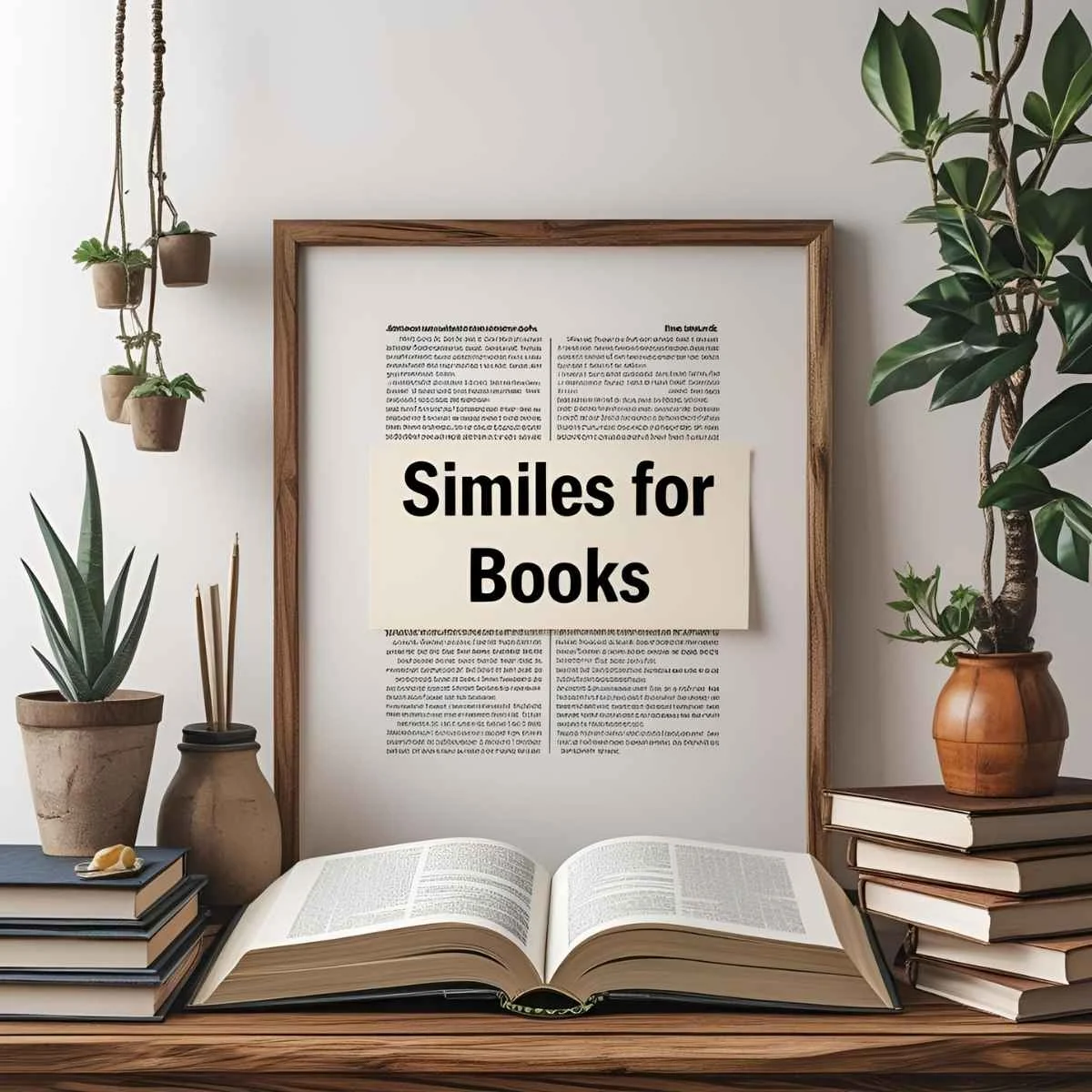The Magic of Similes in Celebrating Books ✨
Similes are like keys to a treasure chest, unlocking vivid imagery by comparing two unlike things with “like” or “as.” They transform simple descriptions into vibrant, relatable pictures, making writing and speech more engaging. Instead of saying, “This book is captivating,” try “This book is like a river, carrying you through twists and turns of adventure.”
Similes elevate books—portals to new worlds—into metaphors that spark emotion and imagination. Whether in essays, book reviews, or casual chats, similes make stories leap off the page.
Ready to dive into the world of books? Let’s explore 25 unique similes for books, organized by theme, to inspire your next literary adventure! 🌟
Similes for Books: 25 Vivid Comparisons
These 25 similes capture the essence of books as gateways to knowledge, adventure, comfort, or culture. Grouped into thematic categories, each simile includes a meaning, a contextual example, and a specific application for writing, speaking, or sharing. Let’s open the pages of creativity!
Books as Adventures 🚢
Similes for books that transport readers to new worlds or thrilling journeys.
- Books flow like rivers, carrying readers through winding tales.
Meaning: Books guide readers smoothly through stories, like rivers carry travelers along their currents.
Example: In a book review, “This fantasy novel flowed like a river, sweeping me through epic battles and magical lands.”
Application: Use in a travel blog or review to describe immersive storytelling, e.g., “This memoir flowed like a river, guiding me through her life’s journey.” - Books soar like wings, lifting readers to new horizons.
Meaning: Books elevate readers to new perspectives, like wings carry birds to the sky.
Example: In a classroom discussion, “This sci-fi book soared like wings, lifting us to a futuristic universe.”
Application: Perfect for a book club pitch or a tweet about an inspiring read. - Books blaze like comets, streaking through the mind with wonder.
Meaning: Books dazzle with exciting stories, like comets light up the night sky.
Example: In a story, “The thriller blazed like a comet, its twists leaving my heart racing.”
Application: Use in a suspense novel review or a post about a page-turner. - Books unfold like maps, guiding readers to uncharted worlds.
Meaning: Books reveal new places step by step, like maps lead explorers.
Example: In an essay, “This adventure novel unfolded like a map, revealing a world of pirates and treasure.”
Application: Great for travel-themed writing or a caption for a bookish Instagram post. - Books spark like campfires, igniting tales of adventure.
Meaning: Books kindle excitement and stories, like campfires start a warm blaze.
Example: In a campfire scene, “The book sparked like a campfire, drawing us into its epic quest.”
Application: Use in a storytelling workshop or a blog about gripping reads.
Books as Teachers 📖
Similes for books that impart wisdom or knowledge.
- Books shine like lanterns, illuminating paths to wisdom.
Meaning: Books light up new ideas, like lanterns guide through darkness.
Example: In a speech, “This history book shined like a lantern, illuminating the past’s lessons.”
Application: Use in an educational essay or a LinkedIn post about learning. - Books are keys, unlocking doors to new knowledge.
Meaning: Books open access to understanding, like keys open locked doors.
Example: In a study group, “The textbook was a key, unlocking the secrets of physics.”
Application: Perfect for a student blog or a caption about academic breakthroughs. - Books bloom like gardens, growing insights with every page.
Meaning: Books cultivate knowledge gradually, like gardens flourish over time.
Example: In a journal, “This philosophy book bloomed like a garden, sprouting new ideas.”
Application: Use in a reflective essay or a tweet about personal growth. - Books are telescopes, revealing distant truths.
Meaning: Books bring far-off concepts closer, like telescopes show distant stars.
Example: In a book report, “This biography was a telescope, revealing the struggles of her life.”
Application: Great for a history class discussion or a post about deep insights. - Books are alchemists, turning words into golden understanding.
Meaning: Books transform simple text into profound wisdom, like alchemists create gold.
Example: In a seminar, “The science book was an alchemist, turning formulas into clarity.”
Application: Use in a study guide or a speech about transformative learning.
Books as Comfort 🛋️
Similes for books that offer solace, escape, or emotional connection.
- Books wrap like blankets, warming hearts with stories.
Meaning: Books provide comfort and coziness, like blankets on a cold day.
Example: In a personal essay, “This novel wrapped like a blanket, soothing me with its familiar characters.”
Application: Use in a book recommendation or a cozy reading vlog. - Books are lighthouses, guiding readers through stormy emotions.
Meaning: Books offer direction during tough times, like lighthouses guide ships.
Example: In a memoir, “The poetry book was a lighthouse, guiding me through grief.”
Application: Perfect for a mental health blog or a post about uplifting reads. - Books cradle like hammocks, holding readers in gentle escape.
Meaning: Books offer a relaxing retreat, like hammocks sway in the breeze.
Example: In a journal entry, “This romance novel cradled me like a hammock, rocking me into its love story.”
Application: Use in a cozy book review or a caption for a lazy Sunday read. - Books are hearthfires, warming souls with familiar tales.
Meaning: Books provide emotional warmth, like fires in a cozy home.
Example: In a book club, “This classic was a hearthfire, warming us with its timeless story.”
Application: Great for a nostalgic essay or a tweet about rereading a favorite. - Books are anchors, grounding readers in moments of peace.
Meaning: Books offer stability and calm, like anchors hold ships steady.
Application: Use in a mindfulness blog or a post about stress-relieving reads.
Books as Companions 🤝
Similes for books as friends or partners in life’s journey.
- Books are friends, whispering stories in quiet moments.
Meaning: Books offer companionship, like friends sharing secrets.
Example: In a reflective piece, “This novel was a friend, whispering adventures during my commute.”
Application: Use in a bookish vlog or a caption about a loyal read. - Books dance like partners, leading readers through every plot twist.
Meaning: Books guide readers smoothly, like dance partners in a waltz.
Example: In a review, “The mystery book danced like a partner, leading me through its clever clues.”
Application: Perfect for a thriller review or a post about engaging plots. - Books are confidants, holding readers’ dreams and fears.
Meaning: Books listen to readers’ emotions, like trusted confidants.
Example: In a diary, “This self-help book was a confidant, holding my hopes for change.”
Application: Use in a personal growth essay or a tweet about relatable reads. - Books are compasses, pointing to new perspectives.
Meaning: Books guide readers to new viewpoints, like compasses show direction.
Example: In a discussion, “This memoir was a compass, pointing me to her unique worldview.”
Application: Great for a diversity essay or a post about eye-opening books. - Books are mirrors, reflecting readers’ own hearts.
Meaning: Books show readers their own emotions, like mirrors reflect faces.
Example: In a book club, “The novel was a mirror, reflecting my own struggles with courage.”
Application: Use in a reflective review or a caption about relatable stories.
Books as Cultural Treasures 🌍
Similes for books tied to heritage, history, or global stories.
- Books are tapestries, weaving cultures into vibrant stories.
Meaning: Books blend diverse traditions, like tapestries weave colorful threads.
Example: In a travelogue, “This novel was a tapestry, weaving India’s myths into its plot.”
Application: Use in a cultural studies essay or a post about global reads. - Books are scribes, preserving tales like ancient chroniclers.
Meaning: Books record stories for posterity, like scribes etched history.
Example: In a history class, “This book was a scribe, preserving the voices of the past.”
Application: Perfect for a historical fiction review or a speech about legacy. - Books are drummers, pulsing with the rhythm of tradition.
Meaning: Books carry cultural beats, like drummers keep time.
Example: In a festival scene, “The folklore book was a drummer, pulsing with ancestral tales.”
Application: Use in a cultural blog or a caption about heritage reads. - Books are mosaics, piecing together global wisdom.
Meaning: Books combine diverse insights, like mosaics form art.
Example: In a study abroad journal, “This anthology was a mosaic, piecing together voices from Asia.”
Application: Great for a travel memoir or a post about diverse literature. - Books are oracles, whispering timeless truths.
Meaning: Books reveal profound insights, like oracles share prophecies.
Example: In a philosophy seminar, “This book was an oracle, whispering truths about existence.”
Application: Use in a deep literary analysis or a tweet about thought-provoking reads.
Creative Examples to Spark Imagination 🎨
These similes paint books as dynamic forces. “Books flow like rivers” captures the pull of a gripping novel, perfect for a thriller review. “Books are hearthfires” evokes the coziness of rereading a classic, ideal for a winter reading vlog. Ever thought of a book as an “alchemist”? Try it when describing a transformative read in an essay! Which simile feels like your favorite book—does it soar like wings or wrap like a blanket?
Try This: Pick a simile and write a sentence about a book you’re reading, like “This mystery flows like a river, pulling me through every twist.” Share it in a book club or on social media!
Practical Applications for Every Reader 📝
These similes can enhance your literary life:
- Essays: Use “books are keys” in a college essay, e.g., “This biography was a key, unlocking my passion for history.”
- Stories: Add “books dance like partners” to a novel, showing a character’s love for reading.
- Speeches: Say “Books are lighthouses, guiding us through challenges” in a graduation speech.
- Social Media: Post “This novel wraps like a blanket, so cozy! 🛋️” for a cozy read recommendation.
- Book Chats: Toss “This book blazes like a comet!” into a book club discussion for flair.
Challenge: Rewrite a sentence about a book, like “I enjoyed this novel” to “This novel sparked like a campfire, igniting my imagination.” Notice the spark it adds!
Conclusion: Let Books Inspire Your Words 🌟
Similes turn books into living, breathing experiences, from “rivers” of adventure to “lighthouses” of comfort. They make your reviews, essays, and chats unforgettable. Why not try one today? Describe your current read with a simile like “This book is a compass, pointing to new truths.” Share it with a friend, tweet it, or write it in your journal. Better yet, create your own—maybe “Books are stars, guiding my dreams.” Books are your canvas, and similes are your brush—paint your story boldly! 🚀



